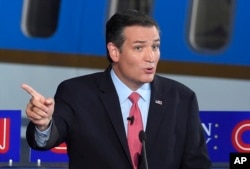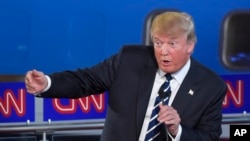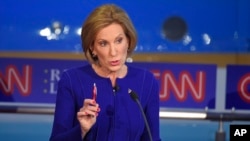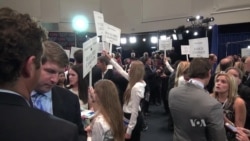Foreign affairs were a central focus at Wednesday's debate between Republican presidential contenders, each of whom argued they offer the strongest alternative to what they see as the weak policies of President Barack Obama.
The 11 leading candidates sparred over issues including how to deal with the Iran nuclear deal, a rising China and assertive Russia, and the Islamic State group.
The Iran nuclear agreement, which has provoked widespread outrage in the Republican Party and is currently being reviewed by Congress, dominated much of the conversation.
Disagreement on Iran deal
Texas Senator Ted Cruz took perhaps the most hawkish position against Iran. If he is elected president, Cruz vowed he will rip the Iran deal "to shreds" on his first day in office.
Former Florida Governor Jeb Bush and Kentucky Senator Rand Paul said that approach is too rash, insisting the next president should not immediately reverse an agreement reached with the U.S.' international allies.
"It's not a strategy to tear up an agreement," said Bush. Instead, he advocated strengthening ties with Iran's foe, Israel, a move he said will create "a healthier deterrent effect than anything else I can think of.''
Scrapping the agreement without checking to see if Iran complies would be "absurd," according to Paul, who said nonetheless he plans to vote against the pact in Congress.
Islamic State
Paul has been a prominent critic of U.S. military involvement in the Middle East, and his comments Wednesday echoed that sentiment. "There will always be a Bush or Clinton for you if you want to go back to war in Iraq," he said.
Regarding the crisis in Syria, Paul said there is no guarantee that intervention - either on the side of President Bashar al-Assad or the rebels seeking to overthrow him - would make America safer.
"Sometimes both sides of the civil war are evil, and sometimes intervention sometimes makes us less safe," he said.
Frontrunner Donald Trump offered his own strategy for dealing with Islamic State extremists and President Assad: "Let them fight each other and pick up the remnants."
Trump holds back
Trump, who has little foreign policy experience and who has recently struggled to answer reporters' questions on various international groups and leaders, was noticeably absent from much of the other discussion on world affairs.
"I will know more about the problems of this world by the time I sit [in the White House,]'' Trump said, even while conceding he did not know as much about foreign affairs as many of the others on stage.
Florida Senator Marco Rubio seized the opportunity, saying Trump's lack of foreign policy credentials made him unfit to lead the country.
"You should ask him questions in detail about the foreign policy issues our president will confront, because you had better be able to lead our country on the first day,'' Rubio said.
No talks with Russia
Carly Fiorina, the former Hewlett Packard chief, also tried to burnish her foreign policy credentials by saying she would refuse to talk with Russian President Vladimir Putin.
"What I would do, immediately, is begin rebuilding the Sixth Fleet, I would begin rebuilding the missile defense program in Poland, I would conduct regular, aggressive military exercises in the Baltic states. I'd probably send a few thousand more troops into Germany," Fiorina said.
"Vladimir Putin would get the message," she added.
Trump earlier suggested he would meet with Putin.
"I would talk to him. I would get along with him. I believe -- and I may be wrong, in which case I'd probably have to take a different path, but I would get along with a lot of the world leaders that this country is not getting along with, he said.
China
In what has become a U.S. presidential election season tradition, the candidates also competed over who would be the toughest on China.
Wisconsin Governor Scott Walker, who has been struggling in recent polls, blasted Obama for planning to host Chinese President Xi Jinping for an official state visit at the White House next week.
"Why would we be giving an official state visit to a country that's been involved in a massive cyber attack against the United States? That's not just a visit, that's a 21 gun salute on the South Lawn of the White House. It just doesn't make any sense," Walker said.
Bush said he does not support canceling the state dinner, but instead would "use offensive tactics as it relates to cybersecurity [to] send a deterrent signal to China."
WATCH: Related video report by Mike O'Sullivan
















